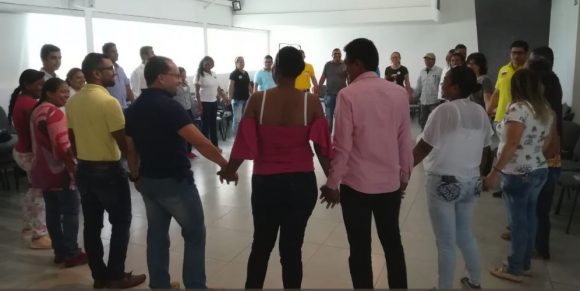NIMD reports increase in deadly violence against Colombian leaders

NIMD and the Colombia’s Electoral Observation Mission (MOE) have launched a report on violence against political, social and community leaders during the COVID-19 crisis.
The report shows an increase in the severity of violence against these leaders, and puts forward a series of public policy recommendations to protect them.
The main finding of the report are:
- Murders of social leaders increased by 85% compared to 2019
- 60% of violence against community leaders resulted in death
- During the month of lockdown, violence against all leaders reduced by 50%.
The rise in deadly attacks poses a serious threat to the country’s democracy and fragile peace.
This press release, intended to raise awareness among the public and civil society, sets out some of the report’s key findings.
What next?
The report sets out 10 recommendations for the Colombian authorities to address the violence against leaders.
- The authorities at different territorial levels should adopt measures to protect and recognize not only the actions of individuals but also the work of the community to defend rights.
- Government ministry officials should promote network building on leadership practices, to serve as a platform for training, improvement and exchange of best practices among local leaders.
- National and local authorities should make a joint effort to implement humanitarian, health and justice missions, and to provide public services to remote areas.
- Officials in Government ministries should implement training and education plans for human rights defenders and leaders.
- Authorities should improve infrastructure and protection to allow for effective and safe leadership in communities.
- Municipal authorities should maintain close and permanent contact with leaders, their organizations and communities.
- All entities of the Judicial Branch and the Office of the Attorney General should prioritize open cases.
- The Municipal Councils for Peace and Reconciliation should be supported as a mechanism for coordination between leaders, communities and local authorities.
- The national Government and local governments should adopt measures to strengthen the participation of communities, social organizations and their leaders in the creation of a Comprehensive Prevention Plans.
- To combat drug trafficking, one of the factors contributing to violence against leaders, authorities should advance in the development and implementation of the Comprehensive Rural Reform.
The Executive Summary of the report sets out the main findings and recommendations. Download the summary here.
Protecting political leaders for a more inclusive democracy in Colombia
The report was released as part of NIMD’s new project, in partnership with MOE, which tackles political violence by promoting a democratic culture in Colombia
The EU-funded project aims to strengthen the State’s capacity to prevent human rights violations of political, social and community leaders, and enhance the protection of their human rights.

As part of this project, NIMD runs Democracy Schools; works to increase communication between State institutions; and increases access to information for civil society and the general public.
Through these actions, we hope to help the Colombian State to put in place concrete policies to reduce violence and cement peace in the country.